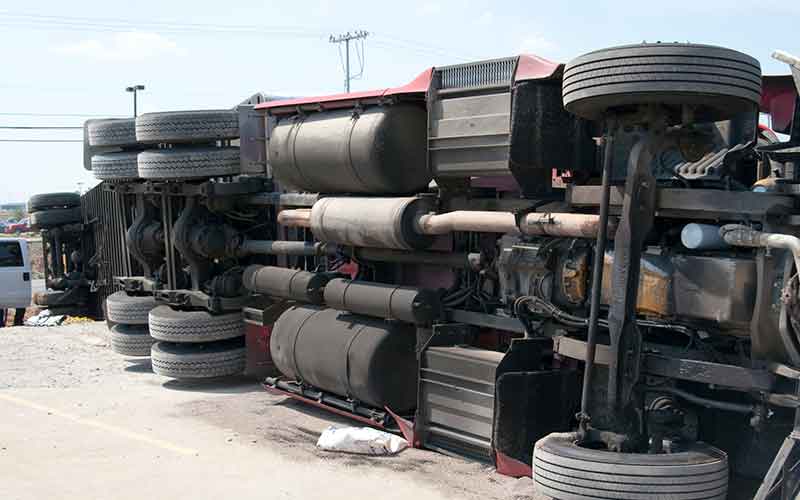What are some of the most common 18-wheeler accidents?
Different types of 18-wheeler accidents can occur, depending on the road conditions and other factors involved. The following questions and answers address some of the most common 18-wheeler accidents.
What is a rollover accident?
When a driver has to suddenly brake or swerve, the 18-wheeler may be prone to rollover. Often this type of accident occurs when a driver is trying to avoid crashing into another vehicle or structure. The truck loses balance and can roll forward or sideways.
What is a jackknife accident?
With sudden braking or if a truck’s brake lock up, the 18-wheeler’s trailer can skid and turn at a 90-degree angle.
In particular, large vehicles are susceptible to jackknifing. If slippery road conditions were the underlying cause, there may not be grounds for claiming the truck driver was negligent. Also, if the driver is braking to avoid another vehicle that has crashed or stalled, this factor may be relevant in determining fault.
What is a wide-turn collision?
When an 18-wheeler makes a right turn, it has to swing toward the left first before it can turn right. However, other drivers sometimes mistake this maneuver for a left turn and crash into the truck. The same thing can occur with left turns and u-turns.
What is an underride accident?
If a smaller vehicle crashes into an 18-wheeler from the side or behind, the impact might force the car under the truck. The car literally rides under the truck. The impact can crush the roof of the vehicle and kill or trap the driver or passengers in the vehicle.
What is a head-on collision?
As the name implies, a head-on collision happens when the front ends of two vehicles collide. Speeding, brake failure, ignoring traffic signs, losing control of the vehicle and driver distraction are often causes of head-on collisions.
What is a T-bone accident?
A T-bone accident occurs when one vehicle crashes into the side of another vehicle, in this case, an 18-wheeler. The name comes from the T shape formed by the accident. Running a red light is often the cause of a T-bone accident.
What is a rear-end 18-wheeler collision?
A rear-end collision occurs when one vehicle runs into the rear end of another one. With 18-wheelers, truck drivers have less time to brake and avoid a collision than drivers in regular passenger cars. If a car stops abruptly the truck behind it may not have time to stop. Passenger cars can also run into the back of an 18-wheeler. Texting while driving and other distractions are often the causes of this type of rear-end accident.
Get legal help with various types of 18-wheeler accidents
For several decades, the Office of Michael R. De La Paz has successfully represented clients in various types of 18-wheeler accident cases in Houston, South Padre Island, Corpus Christi and throughout Texas. Arrange a free consultation to evaluate your potential case.


Recent Comments